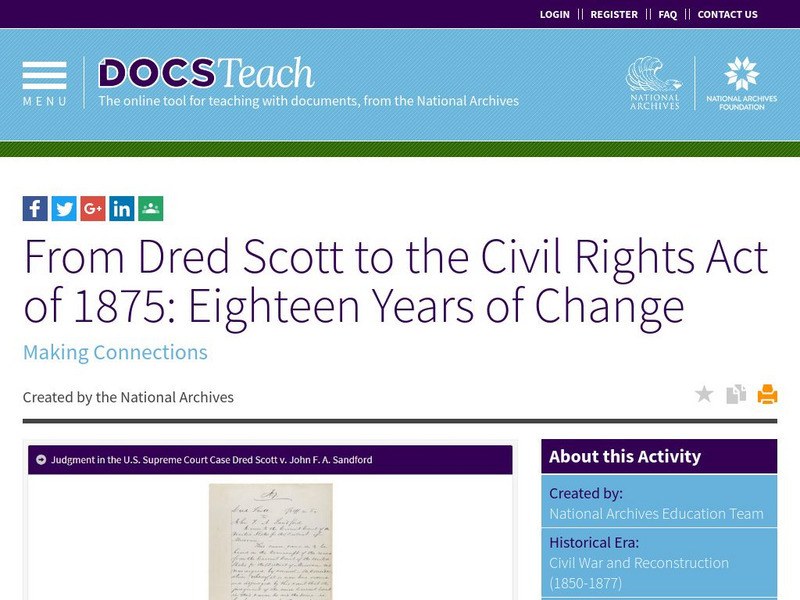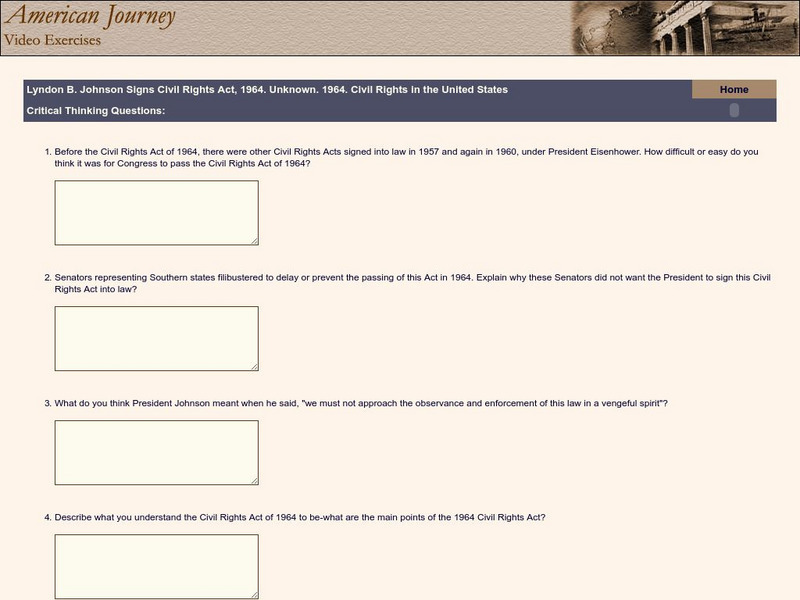Curated OER
Social Studies: Jeffeerson and the Declaration
Students investigate Thomas Jefferson's intentions for the Declaration of Independence. In discussion, they consider what parts of the document are most useful today and to what purposes does it address the most. Finally, students...
Curated OER
Do's and Don'ts of Teaching Black History
Middle schoolers complete activities for Black History month. In this Black history month lesson, students complete assignments their teacher chooses after they have examined the do's and don'ts of teaching the subject.
Curated OER
Actively Organizing Passive Resistance
Students explore organizing to resist oppressive authority without the use of violence. In this philosophy lesson, students research Gandhi's approach to organizing people around a positive cause without the need to be aggressive or...
Curated OER
Understanding Advocacy
High schoolers explore the work of Jane Goodall. In this advocacy lesson, students investigate the life and work of Jane Goodall. High schoolers examine her work as an animal advocate and explore their own personal advocacy styles.
Curated OER
BE-01-01 Introduction to Business Ethics
Students explore ethics. In this business ethics lesson, students watch "The Corporation" and discuss employee policies, community outreach, and business models. Students consider various scenarios that encourage authentic student...
Curated OER
Ahimsa in Writers Workshop
Students investigate nonviolent lifestyles by researching the life of Gandhi. In this journalism lesson, students define the word ahimsa and how important nonviolence is when solving conflicts. Students create a timeline of personal...
Curated OER
Lincoln-Douglas Debates of 1858
Young scholars examine the transcripts of the 1858 Lincoln-Douglas debates and create a platform for each candidate in the 1858 Senate race. They utilize the candidates' arguments to explore the historical and political impact.
US National Archives
Docsteach: From Dred Scott to Civil Rights Act of 1875: Eighteen Years of Change
In 1857, the U.S. Supreme Court ruled in the Dred Scott decision that African-Americans were not citizens of the United States. Yet within 18 years, Black Americans would not only have citizenship, but would be guaranteed the right to...
US National Archives
Nara: Teaching With Documents: Civil Rights Act of 1964 and the Eeoc
The Civil Rights Act of 1964 prohibited not only discrimination based on race, but also gender. Use this lesson plan to explore the document, particularly Title VII in examining the law.
US National Archives
Docsteach: Civil Rights Act, 1964 & Equal Employment Opportunity Commission
This activity asks students to read, analyze, and summarize Title VII of the Civil Rights Act of 1964 that established the Equal Employment Opportunity Commission.
Stanford University
Sheg: Document Based History: Reading Like a Historian: Civil Rights Act of 1964
[Free Registration/Login Required] JFK was known for being supportive of the Civil Rights Movement. In this lesson, students will review two speeches and evaluate the devotion the President had to civil rights.
National Endowment for the Humanities
Neh: Edsit Ement: Civil Rights Movement
This lesson on the Civil Rights movement is organized into three sections: "Identifying the Need for Change," "Ordinary People in the Civil Rights Movement," and "Historic Places in the Civil Rights Movement."
PBS
Pbs Learning Media: Civil Rights Special Collection
Multimedia collection of video, primary text documents and audio on Civil Rights, especially Brown vs. Board of Education.
US National Archives
National Archives: From Dred Scott to the Civil Rights Act of 1875
The Dred Scott case decided that African Americans were not citizens of the United States. However, 18 years later they would have citizenship and many other rights. Students will examine the following documents to understand how and why...
Discovery Education
Discovery Education: Civil Rights: An Investigation
Through the lesson provided here, students will not only learn about civil rights and civil liberty but also understand the key roles played by President Johnson and Martin Luther King Jr. during the civil rights movement. The detailed...
PBS
Pbs News Hour: Your Safety and Security or Your Civil Liberties Lesson
The object of this lesson is to take a look at the USA Patriot Act and the controversies around the Act. Does the Patriot Act defy our Civil Liberties? This lesson will explore that question and more.
Annenberg Foundation
Annenberg Learner: Democracy in America: Civil Rights: Demanding Equality
This unit embraces those individuals who have brought change to the United States in both social and political equality through a Video on Demand, activities, and other enlightening resources.
PBS
Pbs Learning Media: Martin Luther King Jr.: Civil Rights Leader
Students will explore how King's deep-seated commitment to nonviolence contributed to the expansion of social justice in the United States, particularly for African Americans.
Cengage Learning
Video Exercises: Lyndon Johnson Signs Civil Rights Act
Here are five "Critical thinking questions," to accompany a viewing of an "American Journey Online," video on the signing of the Civil Rights act of 1964. Though intended for students who have watched a specific video, the questions...
iCivics
I Civics: Plessy v. Ferguson (1896)
This mini-lesson covers the basics of the Supreme Court's decision that it was constitutional to keep black and white people segregated as long as the accommodations for each race were "equal." Students learn about the concept of...
iCivics
I Civics: Eeoc v. Abercrombie & Fitch (2015)
This mini-lesson explores the Supreme Court's decision regarding a company's discrimination against a Muslim woman during the hiring process. Students learn how Title VII of the Civil Rights Act of 1964 prohibits workplace...
iCivics
I Civics: Lau v. Nichols (1974)
This mini-lesson covers the basics of the Supreme Court's decision that required public schools to provide language supports to English and multilingual learners. Students learn how Lau's arguments relate to the landmark case, Brown v....
Other
National Council for the Social Studies: Cloture Motion to Cease Debate
Using the Civil Rights Bill of 1964 as an example, students will understand the congressional procedures of cloture and filibuster. An in-depth article on how a filibuster was used during debate on this bill, the actual signed cloture...
PBS
Pbs Teachers: Foreign War and Domestic Freedom: (Civil Liberties Lesson Plan)
A lesson plan that directs students to review the concept of civil liberties and to examine examples from American history wherein rights were restricted. They will investigate key arguments between those who seek to restrict liberties...
Other popular searches
- Civil Rights Act 1964
- Civil Rights Act of 1964
- Civil Rights Activism
- Civil Rights Act 2001
- Civil Rights Act Canada
- Civil Rights Act 1965
- Civil Rights Act 1866
- Civil Rights Act 1968
- Civil Rights Activists
- Civil Rights Act of 1866
- Jewish Civil Rights Activists
- Civil Rights Activities


















